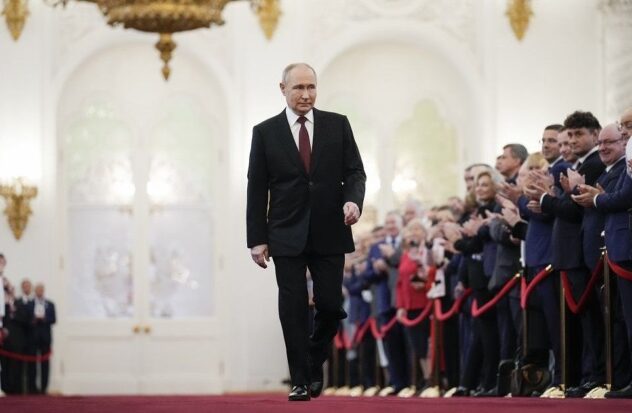At the ceremony in the ornate Grand Kremlin Palace, Putin placed a hand on the Constitution and promised to defend it as a crowd of hand-picked leaders looked on.
“We are a united and great people and together we will overcome all obstacles and carry out our plans. Together we will win,” Putin said after taking office.
Since succeeding Boris Yeltsin as president in late 1999, Putin has transformed Russia from a country emerging from economic collapse into a pariah that threatens global security. Following the invasion of Ukraine in 2022, which has become the largest conflict in Europe since World War II, Russia has faced intense sanctions from the West and is turning to other regimes such as China, Iran and North Korea in search of support.
The new term of Putin, who has been in power for more than a quarter of a century and is the longest-serving Kremlin leader since Josef Stalin, does not expire until 2030, when he could opt for another six-year period.
In a highly choreographed staging, Putin was photographed in his office reviewing some papers before walking through the long corridors of the Kremlin, stopping, at one point, to look at a painting on the way to the event.
His honor guard waited for him in the rain and sleet for hours on a cold morning while the president made the short trip to the palace in his Auras limousine.
Putin took advantage of the first moments of his fifth term to thank the “heroes” of his war in Ukraine and to criticize the West.
Moscow “does not reject dialogue with Western states,” he noted, indicating that “the choice is theirs: do they intend to continue trying to contain Russia, continue with the policy of aggression, of continuous pressure on our country for years, or seek a path of cooperation and peace?”
The Russian leader was received with applause upon entering the room where more than 2,500 people were waiting for him, who, according to his spokesman Dmitry Peskov, were invited to the ceremony. Among them were senior officials of the Russian government and personalities such as the American actor Steven Seagal.
A French diplomat, who spoke on condition of anonymity, confirmed that France’s ambassador to the country attended the inauguration.
U.S. Ambassador Lynne Tracy was not present and Russia’s state news agency Tass said she was out of the country.
The question now is what Putin, 71, will do over another six years, both domestically and internationally.
Russian forces are gaining ground in Ukraine, deploying scorched earth tactics as kyiv faces shortages of troops and ammunition. Both sides are suffering considerable casualties.
Ukraine has taken the battle to Russian soil with drone and missile attacks, especially over border regions. In a speech in February, Putin pledged to meet Moscow’s goals in Ukraine and do whatever is necessary to “defend our sovereignty and the security of our citizens.”
Shortly after his orchestrated re-election in March, Putin suggested that a confrontation between NATO and Russia is possible, and declared that he wanted to establish a security zone in Ukraine to protect his country from cross-border attacks.
In Russia, its popularity is closely linked to improving the standard of living of ordinary Russians.
On Tuesday he once again promised a prosperous future to the population, who since the invasion of Ukraine has seen the cost of living rise.
In 2018, he began his mandate with the promise of placing Russia among the five largest economies in the world, noting that it would be a “modern and dynamic” nation. Instead, the Russian economy has shifted toward a war-based foundation, with record defense spending.
Analysts say that now that Putin has secured another six years in power, the government could take unpopular steps such as raising taxes to finance the war or pressuring more men to join the army.
With the start of the new term, the government will be dissolved so that Putin can appoint a new prime minister and a new executive.
One of the departments to take into account is the Ministry of Defense.
Last year, Defense Minister Sergei Shoigu came under pressure for his management of the war and mercenary leader Yevgeny Prigozhin harshly criticized him for a shortage of ammunition for his company’s troops fighting in Ukraine. Prigozhin’s brief revolt in June against the Defense Ministry was the biggest threat to Putin’s government.
Following Prigozhin’s death two months later in a mysterious plane crash, Shoigu appeared to have survived the infighting. But last month, his protégé, Deputy Defense Minister Timur Ivanov, was arrested on bribery charges amid reports of rampant corruption.
Some analysts have suggested that Shoigu could become a victim of the government reshuffle, although this would be a bold move as the country continues to wage war in Ukraine.
In the years since the invasion, authorities have pursued any form of dissent with a ferocity not seen since Soviet times.
Putin indicated Tuesday that he will continue to silence his critics. He asked those attending the event in the Grand Kremlin Palace to remember the “tragic cost of internal turmoil and convulsions” and said Russia “must be firmly and absolutely resistant to any challenges and threats.”
Putin begins his fifth term with hardly any political opposition in the country.
His main rival, opposition leader Alexei Navalny, died in an Arctic penal colony in February. Other prominent critics have either been jailed or fled the country, and some of his opponents abroad fear for their safety.
Rules have been imposed that threaten long prison sentences for anyone who discredits the army. The Kremlin also attacks independent media, human rights groups, LGBTQ+ activists and others who do not align with what Putin has stressed as Russia’s “traditional family values.”
Source: With information from AP

